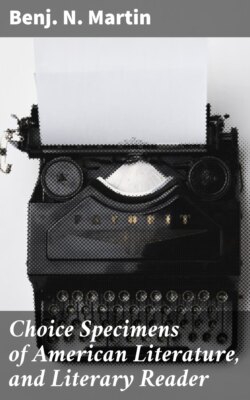Читать книгу Choice Specimens of American Literature, and Literary Reader - Benj. N. Martin - Страница 66
На сайте Литреса книга снята с продажи.
=35.= LIFE IN THE NEW SETTLEMENTS.
ОглавлениеThe early Catholic emigrants to Kentucky, in common with their brethren of other denominations, had to endure many privations and hardships. As we may well conceive, there were few luxuries to be found in the wilderness, in the midst of which they had fixed their new habitations. They often suffered even for the most indispensable necessaries of life. To obtain salt, they had to travel many miles to the licks, through a country infested with savages; and they were often obliged to remain there for several days, until they could procure a supply.
There were then no regular roads in Kentucky. The forests were filled with a luxuriant undergrowth, thickly interspersed with the cane, and the whole closely interlaced with the wild pea-vine. These circumstances rendered them nearly impassable; and almost the only chance of effecting a passage through this vegetable wilderness, was by following the paths or traces made by the herds of buffalo and other wild beasts. Luckily these traces were numerous, especially in the vicinity of the licks, which the buffalo were in the habit of frequenting, to drink the salt water, or lick the earth impregnated with salt.
The new colonists resided in log-cabins, rudely constructed, with no glass in the windows, with floors of dirt, or, in the better sort of dwellings, of puncheons of split timber, roughly hewed with the axe. After they had worn out the clothing brought with them from the old settlements, both men and women were under the necessity of wearing buckskin or homespun apparel. Such a thing as a store was not known in Kentucky for many years: and the names of broadcloth, ginghams and calicoes, were never even so much as breathed. Moccasins made of buckskin, supplied the place of our modern shoes, blankets thrown over the shoulder, answered the purpose of our present fashionable coats and cloaks; and handkerchiefs tied around the head served instead of hats and bonnets. A modern fashionable bonnet would have been a matter of real wonderment in those days of unaffected simplicity.
The furniture of the cabins was of the same primitive character. Stools were used instead of chairs: the table was made of slabs of timber, rudely put together. Wooden vessels and platters supplied the place of our modern plates and china-ware; and a "tin cup was an article of delicate furniture, almost as rare as an iron-fork[12]," The beds were either placed on the floor, or on bedsteads of puncheons, supported by forked pieces of timber, driven into the ground, or resting on pins let into auger-holes in the sides of the cabin. Blankets, and bear and buffalo-skins, constituted often the principal bed-covering.
One of the chief resources for food was the chase. All kinds of game were then very abundant; and when the hunter chanced, to have a goodly supply of ammunition, his fortune was made for the year. The game was plainly dressed, and served up on wooden platters, with corn-bread, and the Indian dish-the well known hominy. The corn was ground with great difficulty, on the laborious hand-mills; for mills of other descriptions were then, and for many years afterwards, unknown in Kentucky.
Such was the simple manner of life led by our "pilgrim fathers." They had fewer luxuries, but perhaps were, withal, more happy than their more fastidious descendants. Hospitality was not then an empty name; every log-cabin was freely thrown open to all who chose to share in the best cheer its inmates could afford. The early settlers of Kentucky were bound together by the strong ties of common hardships and dangers—to say nothing of other bonds of union—and they clung together with great tenacity. On the slightest alarm of Indian invasion, they all made common cause, and flew together to the rescue. There was less selfishness, and more generous chivalry; less bickering, and more cordial charity, then, than at present; notwithstanding all our boasted refinement.
[Footnote 11: Born in Kentucky, and long eminent as a controversial writer and a Prelate of the Roman Catholic church. His "sketches" give much interesting information respecting the early history of that church at the West.]
[Footnote 12: Marshall—History of Kentucky.]
* * * * *
=James Henry Thornwell,[13] 1811–1862.=
From the "Discourses on Truth."
